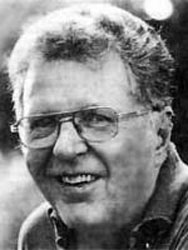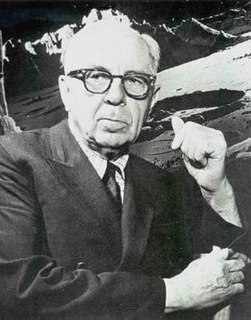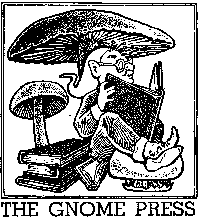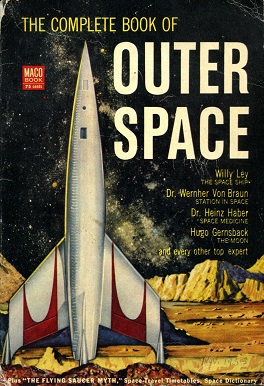
Cyril M. Kornbluth was an American science fiction author and a member of the Futurians. He used a variety of pen-names, including Cecil Corwin, S. D. Gottesman, Edward J. Bellin, Kenneth Falconer, Walter C. Davies, Simon Eisner, Jordan Park, Arthur Cooke, Paul Dennis Lavond, and Scott Mariner. The "M" in Kornbluth's name may have been in tribute to his wife, Mary Byers; Kornbluth's colleague and collaborator Frederik Pohl confirmed Kornbluth's lack of any actual middle name in at least one interview.

Lyon Sprague de Camp was an American writer of science fiction, fantasy and non-fiction. In a career spanning 60 years, he wrote over 100 books, including novels and works of non-fiction, including biographies of other fantasy authors. He was a major figure in science fiction in the 1930s and 1940s.

Eric Frank Russell was a British author best known for his science fiction novels and short stories. Much of his work was first published in the United States, in John W. Campbell's Astounding Science Fiction and other pulp magazines. Russell also wrote horror fiction for Weird Tales and non-fiction articles on Fortean topics. Up to 1955 several of his stories were published under pseudonyms, at least Duncan H. Munro and Niall(e) Wilde.

Walter Michael Miller Jr. was an American science fiction writer. His fix-up novel A Canticle for Leibowitz (1959), the only novel published in his lifetime, won the 1961 Hugo Award for Best Novel. Prior to its publication, he was a writer of short stories.

Chesley Knight Bonestell Jr. was an American painter, designer and illustrator. His paintings inspired the American space program, and they have been influential in science fiction art and illustration. A pioneering creator of astronomical art, along with the French astronomer-artist Lucien Rudaux, Bonestell has been dubbed the "Father of Modern Space art".

Dallas McCord "Mack" Reynolds was an American science fiction writer. His pen names included Dallas Ross, Mark Mallory, Clark Collins, Dallas Rose, Guy McCord, Maxine Reynolds, Bob Belmont, and Todd Harding. His work focused on socioeconomic speculation, usually expressed in thought-provoking explorations of utopian societies from a radical, sometime satiric perspective. He was a popular author from the 1950s to the 1970s, especially with readers of science fiction and fantasy magazines.
The decade of the 1950s in film involved many significant films.

Willy Otto Oskar Ley was a German-American science writer and proponent of cryptozoology. The crater Ley on the far side of the Moon is named in his honor.

Murray Fletcher Pratt was an American writer of history, science fiction, and fantasy. He is best known for his works on naval history and the American Civil War, and for fiction written with L. Sprague de Camp.

Edwin Charles Tubb, also known as E. C. Tubb, and called "Ted" by friends, was a British writer of science fiction, fantasy and western novels. The author of over 140 novels and 230 short stories and novellas, Tubb is best known for The Dumarest Saga, an epic science-fiction saga set in the far future. Michael Moorcock wrote, "His reputation for fast-moving and colourful SF writing is unmatched by anyone in Britain."

Conquest of Space is a 1955 American Technicolor science fiction film from Paramount Pictures, produced by George Pal, directed by Byron Haskin, that stars Walter Brooke, Eric Fleming, and Mickey Shaughnessy.

Gnome Press was an American small-press publishing company primarily known for publishing many science fiction classics. Gnome was one of the most eminent of the fan publishers of SF, producing 86 titles in its lifespan — many considered classic works of SF and Fantasy today. Gnome was important in the transitional period between Genre SF as a magazine phenomenon and its arrival in mass-market book publishing, but proved too underfunded to make the leap from fan-based publishing to the professional level. The company existed for just over a decade, ultimately failing due to inability to compete with major publishers who also started to publish science fiction. In its heyday, Gnome published many of the major SF authors, and in some cases, as with Robert E. Howard's Conan series and Isaac Asimov's Foundation series, was responsible for the manner in which their stories were collected into book form.
"Man in Space" is an episode of the American television series Disneyland which originally aired on March 9, 1955. It was directed by Disney animator Ward Kimball. This Disneyland episode, was narrated partly by Kimball and also by such scientists Willy Ley, Heinz Haber, and Wernher von Braun; as well as Dick Tufeld of Lost in Space fame.

The 11th World Science Fiction Convention, also known as Philcon II, was held in September 1953 at the Bellevue-Stratford Hotel in Philadelphia, Pennsylvania, USA. It was the first Worldcon to present the Hugo Awards. The supporting organization was the Philadelphia Science Fiction Society. The guest of honor was Willy Ley. The chairman was Milton A. Rothman, replacing the late James A. Williams. Isaac Asimov was toastmaster.

Lands Beyond is a study of geographical myths by L. Sprague de Camp and Willy Ley, first published in hardcover by Rinehart in 1952, and reissued by Barnes & Noble in 1993. It has been translated into French, Spanish, Portuguese, and Italian. It was the winner of the 1953 International Fantasy Award for nonfiction.
Everett Franklin Bleiler was an American editor, bibliographer, and scholar of science fiction, detective fiction, and fantasy literature. In the late 1940s and early 1950s, he co-edited the first "year's best" series of science fiction anthologies, and his Checklist of Fantastic Literature has been called "the foundation of modern SF bibliography". Among his other scholarly works are two Hugo Award–nominated volumes concerning early science fiction—Science-Fiction: The Early Years and Science-Fiction: The Gernsback Years—and the massive Guide to Supernatural Fiction.
Ronald Turner was a British illustrator and comic book artist.

The Complete Book of Outer Space is a 1953 collection of essays about space exploration edited by Jeffrey Logan. It first appeared as a magazine, published by Maco Magazine Corp. The first book publication was by Gnome Press in 1953 in an edition of 3,000 copies.

Coming Attractions is a 1957 anthology of science fiction essays edited by Martin Greenberg. Many of the articles originally appeared in the magazines Thrilling Wonder Stories, Astounding, Science Fiction Stories and Fantasy and Science Fiction.

The Best of C. M. Kornbluth is a collection of science fiction and fantasy short stories by American author C. M. Kornbluth, edited by Frederik Pohl. It was first published in hardback by Nelson Doubleday in October 1976 and in paperback by Ballantine Books in January 1977 as a volume in its Classic Library of Science Fiction. A second hardcover edition was issued by Taplinger in November 1977, and an ebook edition by Faded Page in December 1917.















